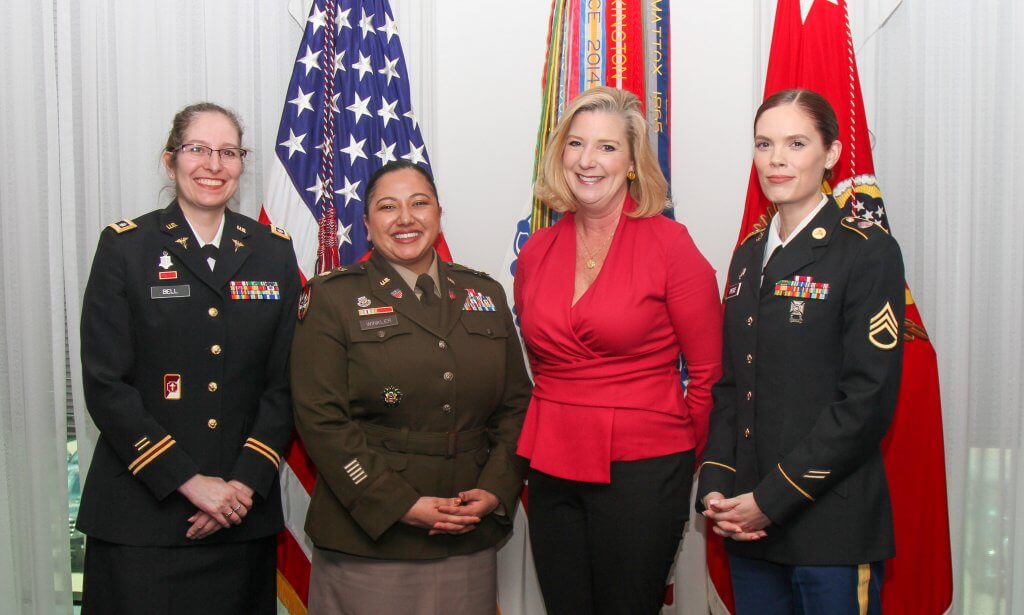The U.S. Army announced a new directive addressing unique challenges faced by soldiers navigating pregnancy through parenthood.
Grassroot efforts by a Facebook group called Army Mom Life inspired changes that are expected to affect 400,00 parents, according to a press release, like Sgt. Maj. Mark Clark Jr. The current G-1 sergeant major has been both a single parent and part of a dual-military household. He spoke during a press conference about his professional and personal interest in the new policies.
“This will be a huge lift to us as we create opportunities for well-deserving soldiers — who are very talented — to be able to continue to serve as soldiers but also be able to have better opportunities to provide for their families so they can stay within the Army,” Clark said. “From a personal standpoint, as I too was once a single parent of three children at Fort Irwin, California, … I understand a lot of unique challenges that soldiers in that status endure.”
Clark credits “the right leadership” with enabling him to continue serving while fulfilling his parental responsibilities. He points out that just as his captain and first sergeant at the time had no idea their support was empowering the future Army G-1 sergeant major, this new directive has the potential to do the same for other future talent to climb the ranks.
Army Secretary Christine Wormuth signed the formal policy earlier this year after various stakeholders worked together to understand the needs of parents around the force. Initially, a white paper was generated by Staff Sgt. Nicole Edge, founder of the Army Mom Life group, who gathered ideas about what changes soldiers wanted to see.
Edge enlisted in 2014 and is a small-group leader for the Basic Leaders Course at Fort Sill, Oklahoma. The single mom of two daughters is passionate about helping the Army be more accepting when it comes to mothers serving, according to her bio. She spoke at a press conference in April 2022 about becoming the unintentional face of the campaign.
“I am one of the ones that I like to kind of stay in the background, and I like to be able to do the work without getting the recognition. Some of them [soldiers] have kind of pushed me to the front, but it’s easy for me because I enjoy making sure that the changes come to fruition. I enjoy seeing the impact that it’s going to have on our soldiers, so I would honestly do anything to be able to make sure that these changes get pushed and that the force is going toward a modern force rather than staying as it is.”
She shared that her group received daily posts from soldiers who were seeing career impacts due to their roles as parents, including being held back from promotions and experiencing the difficulties of being a breastfeeding mom. Edge believes the changes will not only improve quality of life, but they will benefit the Army as a whole.
“The Army spends a lot of money on soldiers to train them and to keep them in the force, so I think it’s going to be extremely impactful with retention. … I also think it’s going to be huge for recruitment as well because our civilians are going to see us be able to make the force more modern,” Edge said.
Nepal-native Maj. Sam Winkler served on the working group that wrote the Army directive. She views this collaboration as a remarkable demonstration of how everyday service members can help shape the force when they “come to the table with real solutions.”
“What’s so exciting about this Army directive is that we have created a true feedback group — we have voices that started at the soldier level, that was heard all the way by our Army senior leaders and they listened — and they took charge and they made changes,” Winkler said.
Ms. Amy Kramer, a special assistant to the Under Secretary of the Army Gabe Camarillo, called the changes “groundbreaking.” She outlined points that characterize the directive:
- Clarifies and makes permanent many existing policies to ensure more equitable application across the Army;
- Introduces new and exciting novel changes to put people first and to better invest in the health, wellness and long-term readiness of the force;
- Aligns Army policies — existing and new — with medical recommendations, such as convalescence leave recommendations from the Defense Health Agency as well as updated lactation guidance from the American Academy of Pediatrics;
- Equitably applies to the extent possible all accommodations and changes to the National Guard and reserves because “we are one Army.”
She added it is a gender neutral policy and accounts for all roles, including fathers, and all new parents, including adoptive parents and guardians of long-term foster children.
The directive includes a mix of new and modified policy changes, such as —
- The body composition exemption for pregnant and postpartum soldiers increases from 180 days to 365 days, after the conclusion of pregnancy.
- Soldiers are exempt from taking a record physical fitness test while pregnant and for 365 days after the conclusion of pregnancy.
- Commanders will provide lactation breaks and a designated lactation area for lactating soldiers, regardless of time after the child’s birth.
The full U.S. Army Parenthood, Pregnancy and Postpartum Directive can be viewed online.

